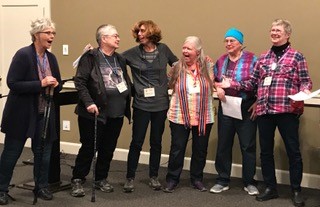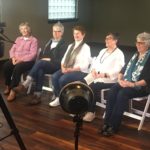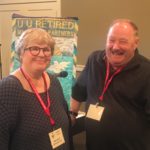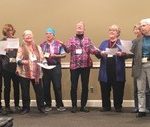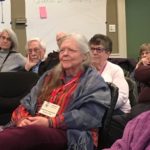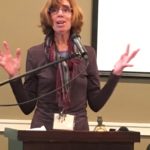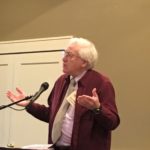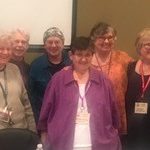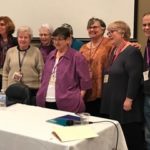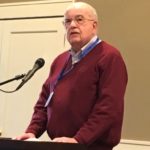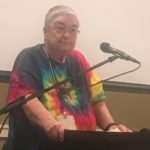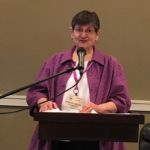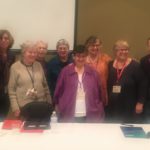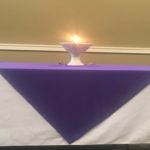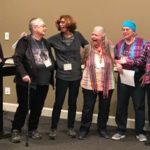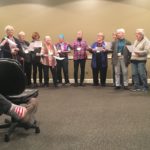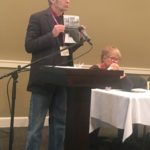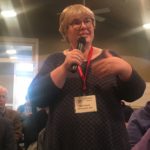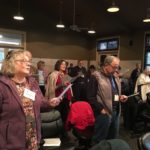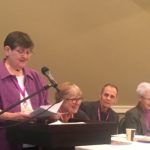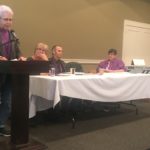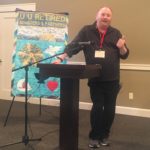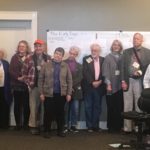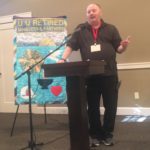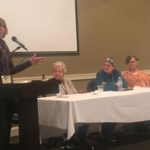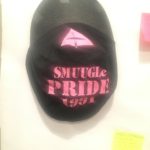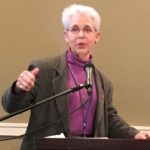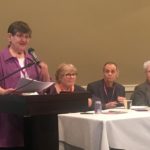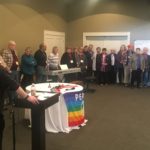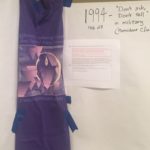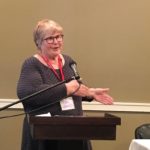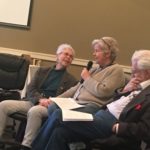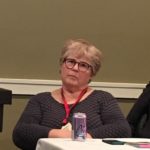2019 Winter UURMaPA Conference Report by Jaco B. ten Hove
CELEBRATING THE RAINBOW
History Made and in the Making
On February 17–20 we gathered at the John Newcombe Tennis Ranch near San Antonio, Texas—almost 60 UURMaPAns (including a few not-yet-retired special guests)—for the first of this year’s two conferences honoring the 50th anniversary of the Stonewall uprising in 1969.
Our stalwart program planning team (led by Phyllis Hubbell) arranged activities to engage us in celebratory reflection on the past five decades of UUs making Rainbow History, as we shared memories, honored departed players and recorded perspectives for posterity. The event itself unfolded in an envelope of historical power.
Our regular UURMaPA conference atmosphere (ably guided by organizer Ginger Luke) was a fruitful container for such meaningful endeavors, and we took full advantage of the many opportunities to chat and relax, not to mention eat together at this Australian-themed retreat center tucked into the deep suburban Texas countryside. There were indeed various earnest gaggles of tennis players scurrying about here and there, as we lingered in and around the Billabong Bar and Crocodile Concourse.
Opening evening worship led by Dorothy Emerson (who was coordinator of the UU Rainbow History Project until her passing in May 2019) helped us let go and be fully present, inviting us to note the variety of all our Coming Out stories and ending with a semi-circle of a dozen enthusiastic singers leading Cris Williamson’s anthem, “Song of the Soul.”
The first day was gloriously packed. Monday morning worship led by Barbara ten Hove noted our arriving “out of many singular rooms” (drawing on the familiar Kenneth Patton reading) to find solace in the names and faces of companions on the journey.
Keith Kron’s keynote cogently rehearsed the flow of people and events that shaped our UU Rainbow History, especially lifting up how much painful struggle was involved even as we patted ourselves on the back for being ahead of other groups. “The work is never done,” he reminded us. (Keith is currently Director of the UUA Transitions Office, and for 14 earlier years he directed the UUA Office of Bisexual, Gay, Lesbian and Transgender Concerns.)
Two afternoon panels shared moving accounts from perspectives of ministers and partners. Then, after dinner, Teresa Novak offered a stirring Odyssey.
The second equally full day began with a regular and potent feature of our conferences, an In Memoriam Service, led by Chris Lilly Backus & Andy Backus, who reminded us in his homily that “We write on the pages of history with indelible ink … It’s not our fingerprints we leave everywhere we go; it’s our soul prints.” Thirty-eight of our colleagues and partners who died recently were acknowledged, including Phillip Hewett, Til Evans, Rudy Gelsey, Victor Carpenter, Will Saunders, Alan Seaburg, Max Gaebler, Scotty Meek, Ray Manker and Clark Olsen.
But wait, there’s more! We then shifted into a compelling program of Remembering Our Ancestors in UU Rainbow History, with profiles of 10 key and sometimes less visible pioneers, who advanced the rights of their communities in years past: Dick Nash, Jim Stoll, Deane Starr, Kay Greenleaf, Rosemarie Carnarius, Mark Mosher DeWolfe, Bob Hadley, Bob Wheatley, Gene Navias, and Frank Robertson. UURMaPA board members read brief life summaries they had prepared (supported by diligent researcher Marni Harmony). By the end of this session there was an intensely palpable spirit in the room; it felt very meaningful. And that was all before lunch!
The afternoon featured a couple of optional workshop possibilities: Movement and Improv with Mary Kay and Dennis Hamilton; and Advocacy pointers with Craig Roshaven, both of which were well received. Concurrently, the professional videographer, who also captured all the major presentations, was filming recollections by a few small groups, including male and female allies, all well moderated by Dee Graham. (These and most of the recorded sessions will eventually be edited and added to the UU Rainbow History website — www.uurainbowhistory.net.)
That evening saw a spirited “Wide Variety Show,” emceed by Jim Eller in fine form, with sketches from the Improv workshop, songs, readings and general good humor. And throughout the days, a Timeline Team (Dorothy Emerson, Donna Clifford and Dee Graham, assisted ahead of conference by UURMaPA Historian Susan Lamar) created an inviting and interactive 50-year chronicle on three walls of the main meeting room, onto which we could add our own memories and comments. See the results online at www.uurainbowhistory.net. There was also a table of intriguing memorabilia.
The farewell morning’s worship service was led by guest Meg Riley (who’s not retired yet, serving well as senior minister of the Church of the Larger Fellowship, but who also had earlier tenure as director of the UUA’s Office of Lesbian and Gay Concerns). After a few days of sitting in rows, Meg made us gather in a circle, wouldn’t you know, and it thoroughly suited our closing mood.
Evaluations were helpfully focused on some aspects that went less smoothly (especially with the sometimes quite awkward site terrain), but overall the event was rewarding to most if not all attendees.
And the journey continues, especially on the UU Rainbow History website, and at our Fall UURMaPA Conference: October 7–10, in Litchfield, CT.
Thanks to Jaco ten Hove and Diane Miller for the photos!
